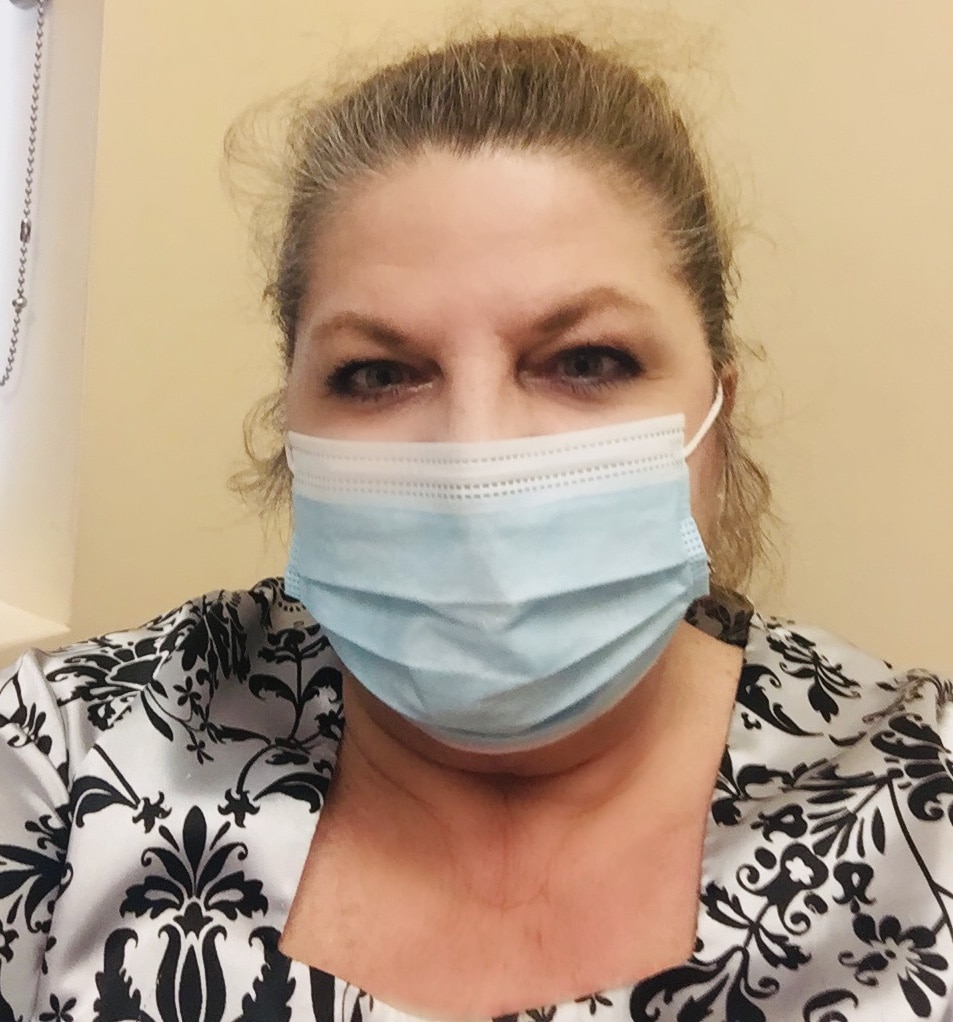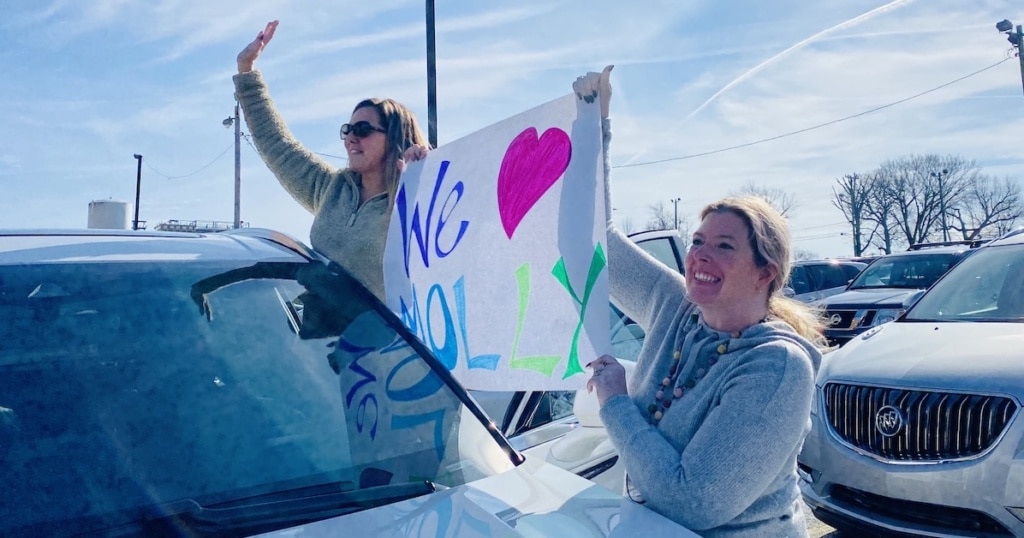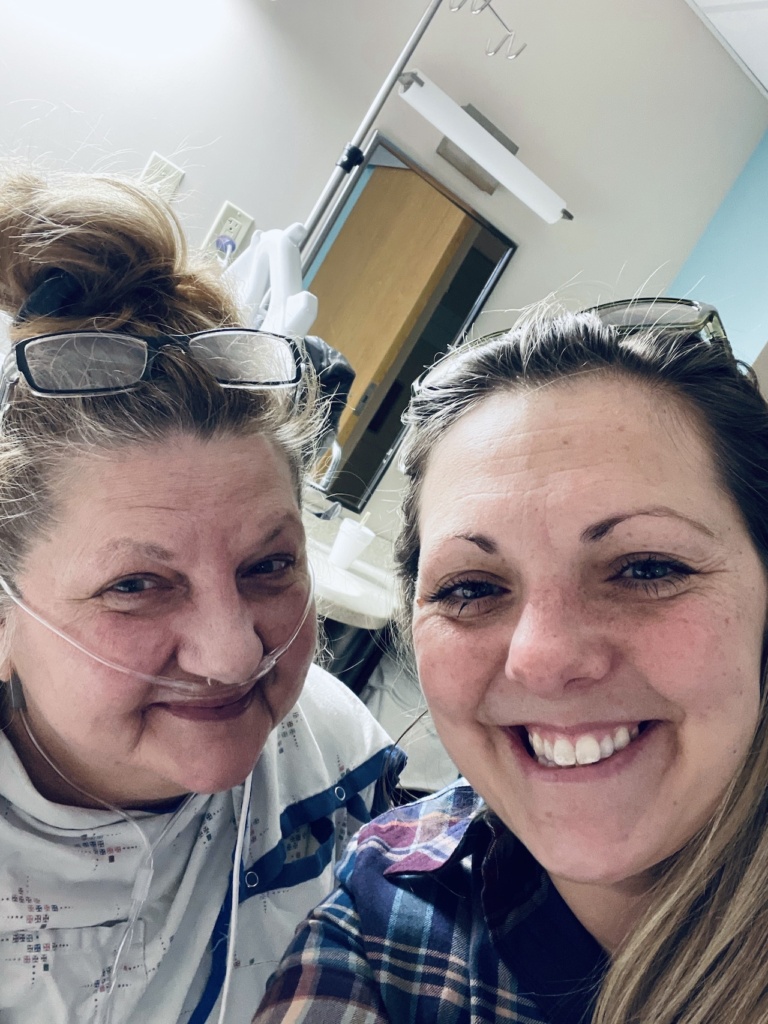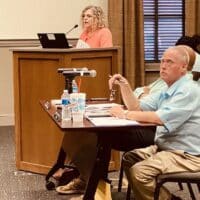Molly Duke can tell you exactly what it feels like when COVID-19 threatens to shut down a 59-year-old woman’s lungs.
“It’s internal screaming — and no matter how loud you scream, there’s only so much that can be done to save you,” she said while being treated for the coronavirus at Jennie Stuart Medical Center in early January. “I could say, ‘You’ve got to have the will to live,’ (but) it’s a lot more than that. COVID doesn’t care. It’s a dark place I hope to never visit again. On any level.”

Imagine being underwater, she says. You can see the surface. It’s that close, and you know the air you need is just on the other side. In your mind, you break the surface like a fish and try desperately to slurp up some oxygen.
But there’s a void where you think the air should be. You get nothing.
“When the oxygen was put on my face, it took a few minutes to even pull that into what little space was left in my lungs,” she said.
A lifelong Hopkinsville resident, Molly was a patient at Jennie Stuart from Dec. 19 to Jan. 14. From there, she was sent to Trigg County Hospital for respiratory rehabilitation. She expected to be in rehab for about a week, but it took a month before she was ready to go home. She recently returned to her job at Oak Grove City Hall, where she is a customer service employee in the city’s utilities department.
Molly is one among 6,266 people who have been diagnosed with COVID-19 in Christian County since the local health department confirmed the first local case on March 19, 2020.
Her illness was more serious than most who have contracted the virus. But among those who have to be hospitalized, she was fortunate to not be placed on a ventilator. She made it out and returned back to work. So far, 85 Christian County residents have died from the virus.
In many ways, Molly’s experience illustrates the larger story of COVID-19 in Christian County. She became ill one day in mid-December. Her daughters, Ansley Grace, 37, and Noelle Duke, 34, noticed she wasn’t feeling well, so she went to First Care, a walk-in clinic, and initially received a prescription for an ear infection.
A few days later, Ansley was shopping downtown and suddenly sensed something was seriously wrong. She believed it was an intuition.
“We need to get out of here. I need to check on my Mom,” she told a friend.

Her mother wouldn’t come to the door, and when Ansley got inside she found her lethargic on the couch. After several minutes, Ansley got her in the car.
Back at First Care, they learned Molly’s oxygen level was dangerously low. Her blood pressure was high. A test for COVID-19 came back positive, and an ambulance arrived to take her to the hospital.
Shortly before midnight, she was admitted to the seventh floor at Jennie Stuart.
She slept for four days. She didn’t want her phone because she didn’t have the energy to text anyone. A nurse checked in with Ansley to keep the family posted.
A few days before Christmas, Molly seemed to improve. She tried to eat tomato soup. She texted her daughters.
But the evening after Christmas in a FaceTime chat, Noelle could see something was wrong. One side of her mother’s face was swollen. The following day, she was in respiratory distress and had to be rushed to the intensive care unit.
“In the worst part of my mother’s life, we couldn’t be there,” Ansley remembers.
For the second time since she’d arrived at the hospital, Molly told a nurse she didn’t want her phone. She couldn’t text.

Her daughters waited.
Eventually, they heard a report directly from their mother.
“I made it through the night,” she texted.
As she improved, Molly was transferred to progressive care.
New Year’s Eve, a favorite holiday for the family, passed with Molly still hospitalized. They were impatient to see her again, and a few days after New Year’s Day, Ansley figured out the location of her mother’s hospital room window facing the visitors’ parking lot on 18th Street.
“I could see my mom and she could see me,” she said.
They both cried. Molly’s oxygen level dipped — a sign that recovery would take a while.
Ansley and a co-worker from Millbrooke Elementary School returned another day and parked across from Molly’s window. They held up a sign they’d made. “We (heart) Molly.”
By Jan. 8, Molly was counting how long she could stand beside her bed with the help of a physical therapist. Three minutes on her feet was a good sign.
Molly says she passed the time watching television and movies. There were long hours of boredom broken up with text messages from friends and her daughters. Occasionally, someone dropped off a food request — a salad from Wendy’s, a kids meal from Zaxby’s.
On Jan. 14, as she prepared to leave in an ambulance that would take her to the Trigg County Hospital, a doctor stopped by to speak to Molly.
He held up his forefinger and thumb to indicate how close they’d come to putting her on a ventilator on the day she was taken to intensive care.
“I don’t know how you did it, but you pulled yourself up,” she says the doctor told her.
After she transferred to Trigg County, she was allowed to have visitors. Longtime friend Mary Martins, a retired police officer, drove over to play cards. Molly said she beat her in Spades.
Molly never hesitated when she described what it was like to be sick with the coronavirus. Like being underwater. Like drowning. Like screaming in a place no one could hear her.
She can also describe her determination to get well again. The virus was a demon and she had to fight. And it’s not over.
But describing how it has changed her to survive a disease that killed so many? She struggles with that.
This could have been a different story. A nurse told Ansley that her mother might not have survived the night if she hadn’t gone to the hospital when she did.
“I’ve come through a tunnel,” Molly said this week. “I’m emotional, more sensitive.”
Her priorities have shifted. She doesn’t like to be rushed. Her evenings are quiet. She says it wouldn’t bother her at all to stand barefoot in the rain. She might enjoy that.
“I do feel different,” she said. “My soul is different.”
Jennifer P. Brown is co-founder, publisher and editor of Hoptown Chronicle. You can reach her at editor@hoptownchronicle.org. She spent 30 years as a reporter and editor at the Kentucky New Era. She is a co-chair of the national advisory board to the Institute for Rural Journalism and Community Issues, governing board president for the Kentucky Historical Society, and co-founder of the Kentucky Open Government Coalition.





